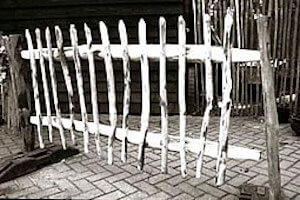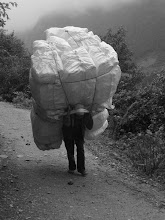Today's phrasal verb is Saddle With, which means:
To be burdened, encumbered or weighed down. To give someone a task or responsibility that is difficult or hard work.
He was saddled with the heavy responsibility of raising his three children alone
They were saddled with heavy expenses.
The boss saddled his secretary with cleaning up all the files over the weekend
They were saddled with heavy expenses.
The boss saddled his secretary with cleaning up all the files over the weekend
The war saddled the country with huge foreign debt.
They saddled me with preparing all the arrangements for the visit.Notes:- Separable and transitive
Synonyms: afflict, bother, crush, cumber, depress, , dish out, dump on, encumber, hamper, handicap, hinder, impede, lade, load, make heavy, obligate, oppress, overcharge, overload, overwhelm, pile, press, , snow under, snow*, stick it to, strain, tax, trouble, try, vex, weigh down, worry
 |
| Someone saddled this poor dog with a ridiculous hat and the job of carrying beer around. |
Today's idiom is Beyond The Pale, which means:
Unacceptable; outside agreed standards of decency. an action that’s regarded as outside the limits of acceptable behaviour, one that’s objectionable or improper.
After he's had a few beers his behaviour is often beyond the pale.
Her rude comments to my friends were really beyond the pale.
The behavior of the pupils during the break was beyond the pale.
 |
| Diogenes, The Cynic, chose to live beyond the pale of society, like a "dog" (Gr. kynikos, "dog-like") |
Origin
The word 'pale' in this expression is not the adjective meaning 'whitish and light in colour', but it is in fact a now obsolete noun that used to mean 'a pointed piece of wood or a stake'. We no longer use this noun, but it is where the verb 'impale' originated from. Of course, a number of 'pales' in a row were used to make fences, and any area enclosed by a fence was believed to be safe. So anything 'beyond the pale' was considered to be outside the area accepted as 'safe'. Historically, several "pales" were created in Europe in order to separate or segregate one community of people from another. Catherine the Great created the Pale of Settlement in Russia in 1791. This was the name given to the western border region of the country, in which Jews were allowed to live. The motivation behind this was to restrict trade between Jews and native Russians. Some Jews were allowed to live, as a concession, 'beyond the pale'. Pales were enforced in various other European countries for similar political reasons, notably in Ireland (the Pale of Dublin) and France (the Pale of Calais, which was formed as early as 1360).




No comments:
Post a Comment